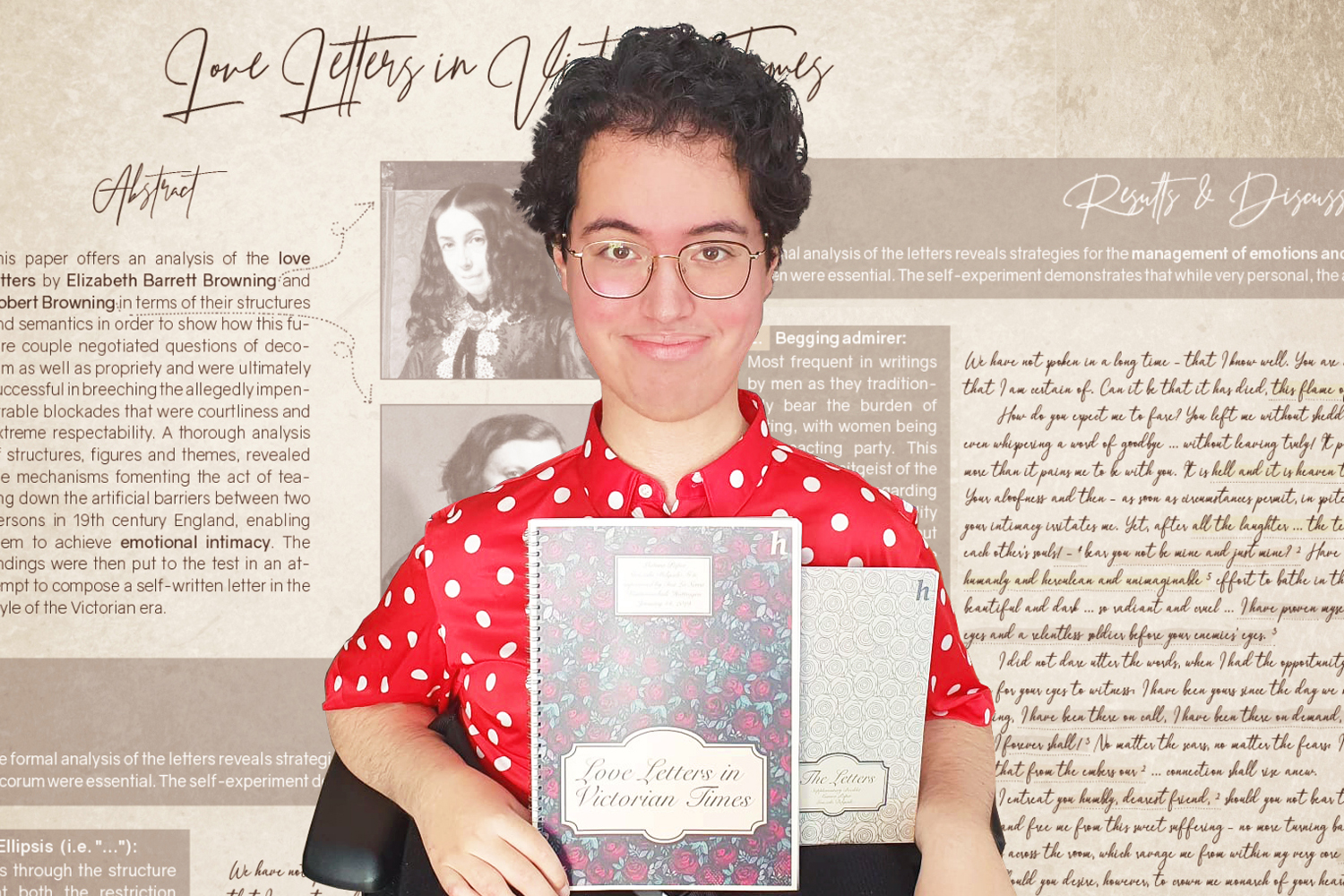Literatur | Philosophie | Sprache
Gonzalo Delgado, 1998 | Dübendorf , ZH
This paper offers an analysis of the love letters by Elizabeth Barrett Browning and Robert Browning in terms of their structures and semantics in order to demonstrate how, during the Victorian era, love was able to breach the allegedly impenetrable blockades of decorum and extreme respectability. Four letters were selected based on their content, length, and materiality. The aim was to dispel the widespread misconception of Victorians as extremely cold and prudish. A thorough analysis of structures such as what I’ve termed the ‚coitus interruptus‘, figures such as hyperbole, and themes including the inscrutability of love revealed the mechanisms that foment the act of tearing down the artificial barriers between two persons. The findings were then put to the test in an attempt to compose a self-written letter in the style of the Victorian era.
Fragestellung
In contrast to a widespread misconception, the Victorians were not emotionally cold and prudish. However, they had to negotiate high standards of propriety and decorum in order to achieve intimacy. The aim of this paper is to unveil some of the strategies employed in written interaction by looking at the letters by renowned poets Elizabeth Barrett and Robert Browning.
Methodik
To arrive at said results, this paper focused on four letters that were analyzed in detail in regards to their structure and semantics in order to show how this future couple negotiated questions of decorum and propriety to achieve emotional intimacy in 19th-century England.
Ergebnisse
It is through structure that both the restriction and expression of passion is most clearly accentuated in the correspondence of Elizabeth Barrett and Robert Browning. Aspects such as paragraphs and punctuation play an important role. The use of hyphens, for instance, served as a form of staccato to illustrate the latent emotions being repressed. Additionally, hyperbole, exaggerations and pleonasms were used for key accentuation. In terms of themes, the most frequent and conspicuous is the inscrutability of love. It served as an approximation to try to make the other understand what one felt while at the same time allowing these feelings to remain implicit. Another recurring theme is duality in love, expressed as a mixture of the subservient spirit in courtship and the fiery passion that true love calls upon. This manifests itself in the writer assuming a position of fierce protector, dutiful and ready to sacrifice anything for their lover. Lastly, examples of what I have termed ‚coitus interruptus‘ allowed for bursts of emotionality that were reigned in by severe ruptures, most often in combination with hyphens. This reaches its full effect when used to stabilize emotions after revealing too much.
Diskussion
The formal analysis of these letters in terms of their structure and semantics reveals strategies for the management of emotions and intimacy in a society in which propriety and extreme decorum are essential. The self-experiment showed that while very personal, the analyzed categories also serve as generalized strategies.
Schlussfolgerungen
There are many more potential points of analysis in the correspondence that are suitable for broader research. The handwriting and traces on the letters themselves offer a variety of possibilities to interpret the circumstances in which they were written. Lastly, an analysis comparing these letters to other Victorian love letters to establish similarities and patterns would be an interesting subject for further research.
Würdigung durch die Expertin
Hannah Schoch
Gonzalo Delgado’s work provides an attentive and detailed analysis of four letters by the two Victorian poets Elizabeth Barrett and Robert Browning. He elucidates key structural and semantic strategies that allow the future couple to negotiate both the demands of societal decorum and propriety, and achieve emotional intimacy. Delgado presents a convincing argument and offers apt categories to tease out how intimacy and emotions are achieved in these written interactions, especially the figure of the ‘coitus interruptus’ is both fruitful and innovative.
Prädikat:
sehr gut
Kantonsschule Hottingen, Zürich
Lehrerin: Ina La Serra



